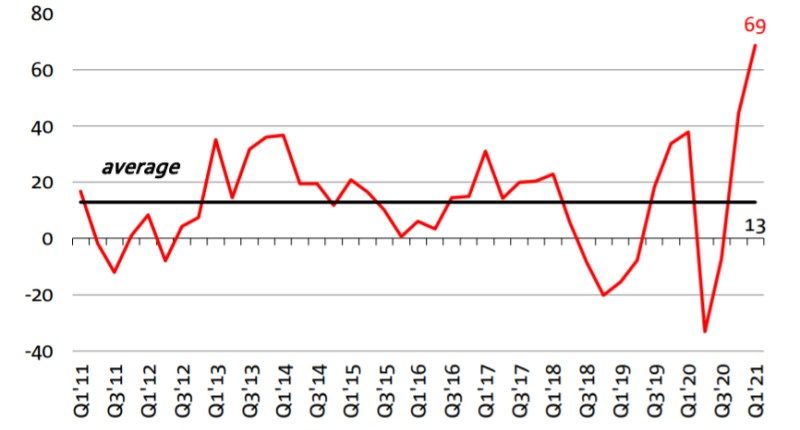- NAB’s latest survey has shown sharply-rising confidence in the housing market
- NAB raises its forecast for dwelling price growth to +14% in 2021, +6% in 2022
- Key drivers: low interest rates, strong recovery in the economy and labour markets
NAB’s Residential Property Index climbed to a new high +69 in the March quarter this year.
So, that means 69% more people are positive about where the housing market is going, than negative. The broad long-term average is +13.
It’s data looking backwards confirming what we all know – the property market is rising, and people are feeling more confident about the housing market overall.
A year ago, the index stood at -36, so confidence has had quite the turnaround, or a V-shaped recovery as it is known these days.
NAB has also upped its prediction for the dwelling price rises this year to +14% growth, and a further +6% next year.
They cite a strong recovery in the economy and labour markets, along with historically-low interest rates, as the main reasons for all this bullishness.
NAB Hedonic Dwelling Price Forecast Change (%) *

All States – bar Victoria at +39 – had ‘very strong’ market sentiment numbers. However, even in Victoria, the index is tracking well above historic averages, and its highest in a year.
Western Australia (+96) and Tasmania (+100) were the most gung-ho states, with rental and price increases expectations the strongest.
Residential Property Index by State

First home buyers and the return of residential investors were also helping to push the housing market to new heights. These factors more than outweighed the fall in overseas buyer activity.
The only laggard in the market was apartment sales, which are not quite experiencing the boom that the main housing market is enjoying. Weaker population growth is mainly to blame for that result.

SOURCE: CoreLogic, NAB Economics.
“More broadly we expect the economy to continue to recover strongly, but for rates to remain low on the back of low inflation and weak wage growth.
“Only once spare capacity in the economy erodes and inflation sustainably returns to target, will the RBA begin lifting rates.”
Alan Ostler, NAB Group Chief Economist
~~
The NAB Quarterly Australian Residential Property survey was first launched in Q1 2011. The external panel of respondents consists of Real Estate Agents/Managers, Property Developers, Asset/Fund Managers and Owners/Investors. Around 330 panellists participated in the Q1 2021 survey.








